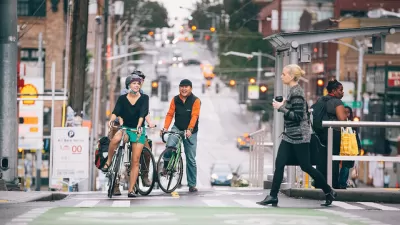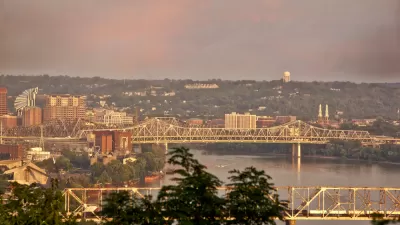Conservatives and libertarians who admonish government spending and transit subsides still support new road and highway construction, and the state power and funding they typically require.
Author and commentator Alex Marshall argues that the current pro-road position of many conservative and libertarian groups doesn't seem to match with their anti-government stance.
"The ancient Romans had a saying: To make a road straight, you need to make someone's neck crooked.
This chilling refrain is a vivid summing up of an obvious fact: Building a road is a manifestation of power, particularly state power. Carving a road across multiple jurisdictions and property lines - not to mention varying terrain - can be done only by an institution that can override the wishes of any one individual.
This was true in the days of the Roman Empire, when mighty roads were built so well that many of them still exist. And it's true today. In the exercise of that authority, local, state and federal governments spent more than $150 billion on roads in 2005, according to the most recent federal Highway Statistics report. That's comparable to what we spend annually on waging war in Iraq.
Given all this, I find it exceedingly strange that a group of conservative and libertarian-oriented think tanks - groups that argue for less government - have embraced highways and roads as a solution to traffic congestion and a general boon to living. In the same breath, they usually attack mass-transit spending, particularly on trains. They seem to see a highway as an expression of the free market and of American individualism, and a rail line as an example of government meddling and creeping socialism."
FULL STORY: King of the Road

Alabama: Trump Terminates Settlements for Black Communities Harmed By Raw Sewage
Trump deemed the landmark civil rights agreement “illegal DEI and environmental justice policy.”

Planetizen Federal Action Tracker
A weekly monitor of how Trump’s orders and actions are impacting planners and planning in America.

The 120 Year Old Tiny Home Villages That Sheltered San Francisco’s Earthquake Refugees
More than a century ago, San Francisco mobilized to house thousands of residents displaced by the 1906 earthquake. Could their strategy offer a model for the present?

LA’s Tree Emergency Goes Beyond Vandalism
After a vandal destroyed dozens of downtown LA trees, Mayor Karen Bass vowed to replace them. Days later, she slashed the city’s tree budget.

Sacramento Leads Nation With Bus-Mounted Bike Lane Enforcement Cameras
The city is the first to use its bus-mounted traffic enforcement system to cite drivers who park or drive in bike lanes.

Seattle Voters Approve Social Housing Referendum
Voters approved a corporate tax to fund the city’s housing authority despite an opposition campaign funded by Amazon and Microsoft.
Urban Design for Planners 1: Software Tools
This six-course series explores essential urban design concepts using open source software and equips planners with the tools they need to participate fully in the urban design process.
Planning for Universal Design
Learn the tools for implementing Universal Design in planning regulations.
Ada County Highway District
Clanton & Associates, Inc.
Jessamine County Fiscal Court
Institute for Housing and Urban Development Studies (IHS)
City of Grandview
Harvard GSD Executive Education
Toledo-Lucas County Plan Commissions
Salt Lake City
NYU Wagner Graduate School of Public Service





























